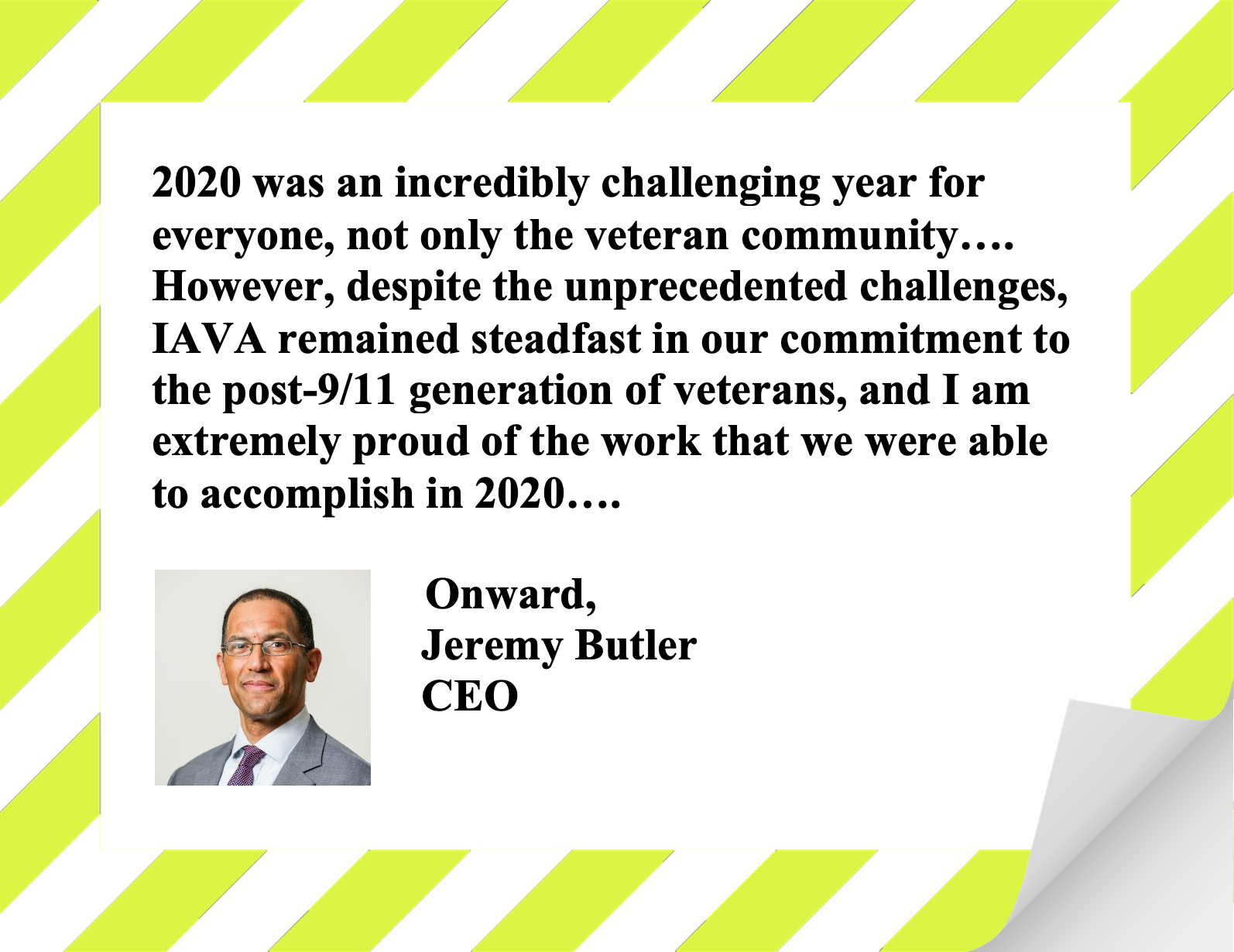IAVA's Policy Agenda for the 117th Congress
Employment, Military Family Stability, and Transition
Employment, Military Family Stability, and Transition
When a service member transitions out of the military, one of the largest and most significant barriers to veteran employment is not only pairing military skills to relevant civilian careers but also reside in the realm of licensure and formal accreditation. Almost 70% of IAVA members didn’t have a job secured when they left the military, and over 80% did not have a permanent place to live and reported couchsurfing after they transitioned out of the military. Many veterans report that business leaders and various institutions simply do not understand the value they bring to their companies and organizations.
In 2011, Congress passed the IAVA-led Vow to Hire Heroes Act, a landmark piece of legislation to help reduce veteran unemployment. At the end of 2020, the veteran unemployment rate across all eras of veterans is at 6.3%, slightly below the national average of 6.7%. However, the post-9/11 veteran unemployment rate remains higher than their peers, and slightly above the national average. Veteran unemployment, especially for younger veterans, has been hit particularly hard by the pandemic, and it will require unique solutions to solve this ongoing problem.
There are multiple tracks to veteran and military family employment and matching veterans to the right career. Unfortunately, finding the right job can be difficult when employers do not understand a veteran’s skills and experience. This continues to be a contributing factor for recently discharged veterans unemployment and underemployment. According to IAVA’s last member survey, 34% of respondents felt underemployed. Being able to translate military skills for civilian use is their third most important job factor, behind mental health injuries and competing with candidates who have been in the civilian workforce longer, our members look at when looking for work. It is in everyone’s best interest to get the fit right. Veterans and military spouses who have jobs in their preferred career field do better work and remain in those jobs for longer.
The military lifestyle can also present significant challenges for military spouses and children. A 2019 survey by Blue Star Families found that a top barrier to employment for military spouses was the job demands of a servicemember. Often required to move because of their service, military spouses can confront challenges in finding a new job or transferring licenses and certifications to continue their careers in their new homes.
Additionally, mental health resources for military and veteran families are insufficient to meet their needs. The lives of military families are characterized by multiple stressors—frequent moves, lack of family network, supporting the demands of military culture and deployments, sometimes repeat deployments, of loved ones. The availability of family-centered support is critical to ensuring that the military family is supported throughout these demands.
IAVA's Recommendations
Military Families:
- Continue to allow DoD and VA to partner with community-based nonprofits like the Tragedy Assistance Program for Survivors (TAPS), Blue Star Families (BSF), National Military Family Association (NMFA), and other VSOs to assist military families and survivors
- Provide tax credits to offset expenses by military spouses who must obtain professional or trade licenses or certifications when the Active or Reserve service member is relocated to a state in which the spouse is no longer qualified to work and allow for greater reciprocity for professional licenses between states
- Provide 18 weeks of maternity leave for women in all military branches, and 21 days for fathers or secondary caregivers to use in the first year in the child’s life and expand parental leave to recognize adoptive parents and fathers
- Improve access to affordable and high-quality child care services, especially for military families and National Guard members who live off base and have fewer available options
- Eliminate barriers to federal nutrition assistance programs for low-income military families and allow assistance to families living below 130% of the poverty level
- Ensure that all base housing is fully compliant with the DoD Military Housing Privatization Tenant Bill of Rights
- Increase Dependency and Indemnity Compensation
- Retain benefits upon remarriage
- Improve Death Gratuity to align with intended purpose
- Preserve and enhance survivor benefits
- Strengthen educational support for surviving families
Transition:
- Provide more accessible and clearer information about financial education opportunities to help military families make better financial decisions
- Expand VA mental health services to veterans’ families, including children, parents, siblings and significant others, when the veteran is receiving treatment for mental health or behavioral health problems
- Encourage military spouses to attend Transition Assistance Program courses along with their spouse and ensure slots are available to support demand. Develop a special track for military families
Employment:
- Support retraining programs for veterans that have lost their job due to a pandemic
- Allow veterans to use their GI Bill benefits as seed money for starting a small business or start-up
- Establish a set of best practices for recruiting, hiring and employing veterans that can be disseminated and adopted by all public and private organizations, and educate prospective employers through a national public awareness campaign
- Ensure all legislation that promotes small business and manufacturing jobs specifies a benchmark for inclusion of veteran hiring and/or veteran-owned businesses.
- Train human resource professionals, either through nonprofits or through the DOL, on the unique experiences of service members
IAVA's Policy Priorities
Select a topic from the list below to learn about IAVA’s policy recommendations for the 117th Congress.

